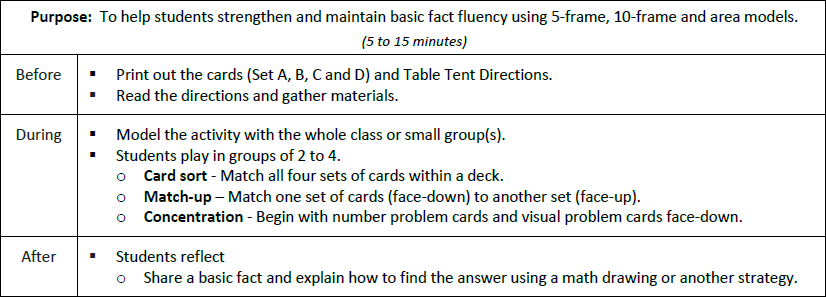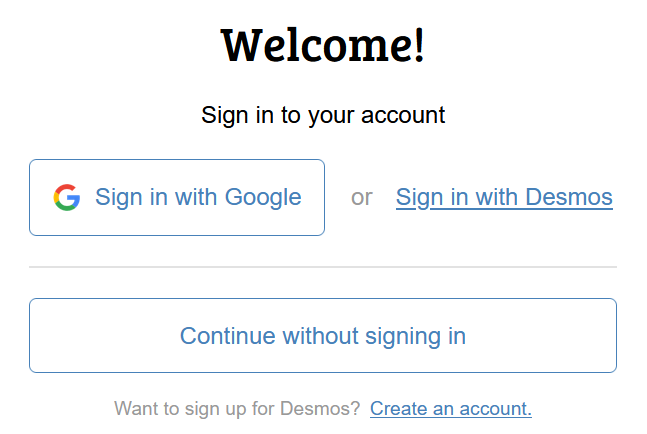Visual Fluency Cards

If you do not have a Desmos teacher account, have your students click “Continue without signing in” to begin the card sort.

Understanding fluency, suggestions for use, and instructional design
Intended Purpose
To help students strengthen and maintain basic fact fluency using 5-frame, 10-frame and area models
- Addition to 5 and 10 (Count on from the greatest number)
- Addition to 20 (Make a ten)
- Subtraction within 5 and 10 (Count up to subtract)
- Subtraction within 20 (Count up and make a ten)
- Multiplication (Multiply by 5 and some more)
- Division (Think multiply to divide)
Understanding Fluency
Procedural fluency is described as “skill in carrying out procedures flexibly, accurately, efficiently, and appropriately”. (Addition It Up: Helping Children Learn Mathematics, 2001)
Characteristics of fluency include:
- flexibility, to use number relationships with ease in computation
- efficiency to choose an appropriate, expedient strategy for a specific computation problem, and
- accuracy, to produce a correct answer. (Parrish, 2010)
It is not simply memorizing answers! The best way to develop fluency with numbers is to develop number sense and to work with numbers in different ways, not to blindly memorize without number sense. (Boaler, 2015)
Delta Math visual fluency cards were inspired by Graham Fletcher’s Multiplication Subitizing Cards and are available thanks to the leadership and partnership of the Berrien RESA.
From Memory and Memorization: There IS a Difference
- This ignite talk by Graham Fletcher provides a great opportunity for educators to discuss pathways to basic fact fluency
Suggestions for use:
Distributed/spaced practice after students have explored the targeted fluency strategy using manipulatives and drawings
- Tier 2 and Tier 3 intervention lessons introduce and provide practice with all three phases of the Concrete-Representation-Abstract (C-R-A) learning progression. (Build, Draw and Write)
- Additional guided practice provide graphic organizers focused on the last two phases of C-R-A. (Draw and Write)
Explore each deck of cards with the following progression
- Card sort matches all four sets of cards within a deck
- Match-up #1 begins with the number problem cards face-down and the visual problem cards face-up
- Concentration #1 begins with both number problem cards and visual problem cards face-down
Instructional Design:
- Approximately 5 to 15 minutes per session
- Math talk samples help students communicate fluency strategies
- The facts provided in each deck were limited to the facts students generally find difficult.
Add To 5
![]() Table Tent Directions - Add to 5
Table Tent Directions - Add to 5
![]() Visual Fluency Cards - Add to 5
Visual Fluency Cards - Add to 5
![]() Modified to be printed on different colored card stock
Modified to be printed on different colored card stock
- page 1 (set A): pink
- page 2 (set B): yellow
- page 3 (set C): light blue
- page 4 (set D): purple
Add To 10
![]() Table Tent Directions - Add to 10
Table Tent Directions - Add to 10
![]() Visual Fluency Cards - Add to 10
Visual Fluency Cards - Add to 10
Modified to be printed on different colored card stock
- page 1 (set A): pink
- page 2 (set B): yellow
- page 3 (set C): light blue
- page 4 (set D): purple
Add To 20
![]() Table Tent Directions - Add to 20
Table Tent Directions - Add to 20
![]() Visual Fluency Cards - Add to 20
Visual Fluency Cards - Add to 20
![]() Modified to be printed on different colored card stock
Modified to be printed on different colored card stock
- page 1 (set A): pink
- page 2 (set B): yellow
- page 3 (set C): light blue
- page 4 (set D): purple
Subtract Within 5
![]() Table Tent Directions - Subtract within 5
Table Tent Directions - Subtract within 5
![]() Visual Fluency Cards - Subtract Within 5
Visual Fluency Cards - Subtract Within 5
![]() Modified to be printed on different colored card stock
Modified to be printed on different colored card stock
- page 1 (set A): pink
- page 2 (set B): yellow
- page 3 (set C): light blue
- page 4 (set D): purple
Subtract Within 10
![]() Table Tent Directions - Subtract within 10
Table Tent Directions - Subtract within 10
![]() Visual Fluency Cards - Subtract Within 10
Visual Fluency Cards - Subtract Within 10
![]() Modified to be printed on different colored card stock
Modified to be printed on different colored card stock
- page 1 (set A): pink
- page 2 (set B): yellow
- page 3 (set C): light blue
- page 4 (set D): purple
Subtract Within 20
![]() Table Tent Directions - Subtract within 20
Table Tent Directions - Subtract within 20
![]() Visual Fluency Cards - Subtract Within 20
Visual Fluency Cards - Subtract Within 20
![]() Modified to be printed on different colored card stock
Modified to be printed on different colored card stock
- page 1 (set A): pink
- page 2 (set B): yellow
- page 3 (set C): light blue
- page 4 (set D): purple
Multiplication
![]() Table Tent Directions - Multiplication
Table Tent Directions - Multiplication
![]() Visual Fluency Cards - Multiplication
Visual Fluency Cards - Multiplication
![]() Modified to be printed on different colored card stock
Modified to be printed on different colored card stock
- page 1 (set A): pink
- page 2 (set B): yellow
- page 3 (set C): light blue
- page 4 (set D): purple
Division
![]() Table Tent Directions - Division
Table Tent Directions - Division
![]() Visual Fluency Cards - Division
Visual Fluency Cards - Division
![]() Modified to be printed on different colored card stock
Modified to be printed on different colored card stock
- page 1 (set A): pink
- page 2 (set B): yellow
- page 3 (set C): light blue
- page 4 (set D): purple
